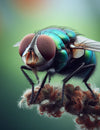
The rainy season brings relief from the scorching heat and revitalizes nature with its gentle showers. However, along with the rain, it also ushers in a plethora of insects and mosquitoes, which can turn our homes into breeding grounds for discomfort and disease. To ensure a peaceful and pest-free rainy season, it's essential to take proactive measures to keep these unwanted visitors at bay. In this article, we will explore a range of effective tips and strategies to help you repel insects and mosquitoes during the rainy season. From natural remedies and cleanliness practices to protective screens and insect-repellent products, you'll discover practical ways to create a safe and bug-free environment in your home. So, let's delve into these valuable tips and bid farewell to pesky intruders, allowing you to enjoy the rainy season to its fullest.
Natural Repellents: Keeping Insects and Mosquitoes at Bay During the Rainy Season
The rainy season brings about lush greenery and a refreshing ambiance, but it also invites a host of unwanted guests, namely insects and mosquitoes. These buzzing intruders can quickly turn a peaceful evening indoors into a bothersome affair. While commercial insect repellent sprays are readily available, many individuals prefer natural alternatives due to concerns about chemicals and their potential impact on health and the environment. If you're looking for effective natural repellents to keep insects and mosquitoes away during the rainy season, we've got you covered.
One popular option is to make your own insect repellent spray using natural ingredients. This homemade solution can be just as effective as its commercial counterparts while providing peace of mind. To create a simple yet potent insect repellent spray, start by combining essential oils known for their insect-repelling properties. Citronella, lemongrass, eucalyptus, and lavender are excellent choices. Dilute the essential oils in a base of water or witch hazel, and pour the mixture into a spray bottle. Shake well before use and apply the spray to exposed skin, clothing, and around doorways or windows.
Essential oils are renowned for their powerful aromas that insects find unpleasant. Citronella, in particular, is widely recognized for its ability to repel mosquitoes. Lemongrass possesses a similar effect, while eucalyptus and lavender also act as deterrents for various types of insects. By combining these oils, you can create a natural insect repellent spray that not only keeps insects at bay but also adds a pleasant scent to your surroundings.
Another natural ingredient that acts as a powerful insect repellent is neem oil. Extracted from the neem tree, this oil has been used for centuries in traditional medicine and pest control. Its strong odor and bitter taste repel a wide range of insects, including mosquitoes, flies, and ants. Neem oil can be mixed with a carrier oil, such as coconut oil, and applied directly to the skin or added to a spray bottle for easy application.
Eliminate Breeding Sites: Preventing Insect and Mosquito Infestations During the Rainy Season
The rainy season brings much-needed relief from the heat, but it also creates ideal conditions for insects and mosquitoes to breed and thrive. To protect yourself and your home from these pesky intruders, it's crucial to eliminate potential breeding sites. By identifying and eliminating areas where stagnant water accumulates, you can significantly reduce the risk of insect and mosquito infestations.
One of the most effective ways to combat these pests is to remove standing water from your surroundings. Mosquitoes, in particular, require stagnant water to lay their eggs. Start by inspecting your property for any sources of standing water, such as flower pots, gutters, birdbaths, or discarded containers. Empty or regularly change the water in these areas to disrupt the breeding cycle.
Additionally, ensure that your outdoor area is properly drained. Unclog gutters and downspouts to prevent water accumulation. Fix any leaks or faulty plumbing to avoid puddles and damp areas. If you have a pond or water feature, consider introducing fish that feed on mosquito larvae, such as goldfish or guppies.
It's equally important to address indoor breeding sites. Check for areas of your home that may collect water, such as leaky pipes, dripping faucets, or condensation around air conditioning units. Fix these issues promptly and ensure proper ventilation to prevent moisture buildup.
By diligently eliminating breeding sites, you can significantly reduce the number of insects and mosquitoes in your surroundings. This proactive approach not only helps protect your home from infestations but also contributes to the overall well-being and comfort of your living environment during the rainy season.
Maintain Cleanliness: A Key to Keeping Insects and Mosquitoes at Bay During the Rainy Season
During the rainy season, insects and mosquitoes seek refuge from the downpour by infiltrating our homes. To prevent these unwelcome guests from finding hiding spots and breeding grounds, maintaining cleanliness becomes paramount. By implementing regular cleaning practices and proper waste disposal, you can create an environment that is less attractive to insects and mosquitoes.
One essential step is to ensure that your home remains free of clutter. Piles of newspapers, magazines, and unused items provide ample hiding places for insects. Regularly declutter your living spaces, dispose of unnecessary items, and keep storage areas well-organized. Vacuum and dust frequently to remove potential food sources and hiding spots.
Proper waste management is also crucial. Dispose of trash in sealed containers and empty them regularly to prevent odors and attractants that lure insects. Rinse food containers before disposal to minimize the chances of attracting pests. Clean up spills and crumbs promptly, as these can attract insects, particularly ants.
Sweep and mop your floors regularly to remove any traces of dirt or food particles. Pay special attention to areas where moisture tends to accumulate, such as kitchen and bathroom floors. Keeping these areas dry and clean can help discourage insects from taking up residence.
In addition to indoor cleanliness, it's important to maintain a tidy outdoor environment. Trim overgrown vegetation, clear debris, and regularly mow your lawn. Remove fallen leaves and stagnant water from gutters, as they can become breeding sites for mosquitoes.
By prioritizing cleanliness, you create an environment that is less conducive to insect and mosquito infestations. These simple yet effective practices contribute to a healthier and more enjoyable living space, allowing you to embrace the rainy season with peace of mind.
Install Protective Screens: Shielding Your Home from Insects and Mosquitoes During the Rainy Season
As the rainy season arrives, so does the influx of insects and mosquitoes seeking shelter from the wet weather. To fortify your home's defense against these persistent intruders, consider installing protective screens on doors and windows. These screens provide an effective barrier, allowing fresh air to circulate while keeping insects and mosquitoes at bay.
Protective screens come in various types, including mesh screens, magnetic screens, and retractable screens. Mesh screens are a popular choice as they are affordable, easy to install, and provide excellent protection against insects. Magnetic screens offer convenience, allowing easy passage for humans while automatically sealing shut behind them to prevent bugs from entering. Retractable screens are ideal for larger openings and can be pulled back when not in use.
Proper installation of protective screens is crucial for their effectiveness. Ensure that screens are tightly fitted and without any gaps or holes where insects can sneak through. Regularly inspect and repair any damage to maintain their integrity.
In addition to doors and windows, consider installing screens on other openings, such as vents or chimney openings. These areas can often serve as entry points for insects and mosquitoes.
Not only do protective screens provide a physical barrier against insects and mosquitoes, but they also allow you to enjoy the fresh air and natural ventilation that the rainy season brings. With screens in place, you can confidently keep your doors and windows open, knowing that unwanted pests are kept outside.
By investing in protective screens, you create a protective shield that significantly reduces the risk of insect and mosquito infestations, creating a more comfortable and insect-free living environment during the rainy season.
Also Read
How to Stop Mosquitoes from Breeding



